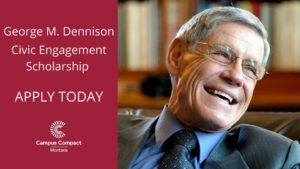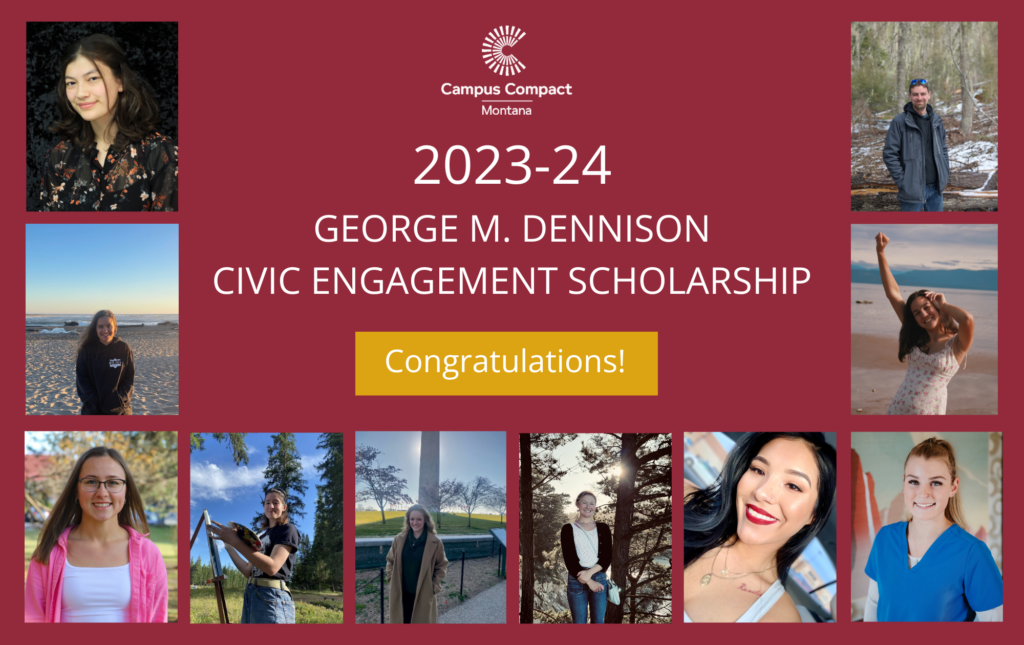ABOUT
The George M. Dennison Civic Engagement Scholarship honors the legacy of students at MTCC affiliate campuses who have volunteered significant time, energy, and resources – while pursuing a degree or certificate – to projects that make a meaningful difference in the lives of others. Half of the funds for each $1000 scholarship have been donated in memory of George M. Dennison by Jane Dennison and their sons, Rick and Robert Dennison, and their families.
Applications for 2024-25 will open in fall 2024. Watch this space for the application link.
ANNOUNCEMENTS
2023-24 George M. Dennison Civic Engagement Scholarship recipients announced
This year, we received a remarkable collection of applications from our affiliated campuses throughout Montana. The college students who applied demonstrated a commitment to George M. Dennison’s vision of fostering resilient, fair, and upstanding communities through volunteerism, civic engagement, and service.
The applications of each student showcased a diverse array of service activities aimed at tackling unmet needs within their respective communities.
Geri Cutler, Carroll College
“My vision for my community and the world is one in which everyone is included regardless of age, ethnicity, religion, gender identity, or ability. This means constructing a community and, at large, a society, in which individuals are not defined by social constructs and can participate fully in society however they see fit.”
Mary Knight, Carroll College
“Human civilization is built on supporting one another. As Americans and as humans, our best trait is our willingness to step in and help. I believe that the first step towards making a difference is to do what you can, when you can. Helping people doesn’t have to be a full-time job. It can be volunteering on weekends or during breaks.”
Abigail Pilskalns, Flathead Valley Community College
“My community is a diverse group of people learning to love and lift each other up. Even though we are diverse and have separate pasts and beliefs, we can be connected because of it. I add to my community by being there for anyone who needs help.”
Kiersten Clark, Flathead Valley Community College
“My vision for this community is to provide better quality care at an affordable rate to our hard-working community members. Montanans have been recognized for generations for being generous, loyal, and dedicated to each other and their communities. My vision and goal is to create a health care community that provides excellent patient care while still providing transparent pricing.”
Bridgette Shields, Aaniiih Nakoda College
“My vision would be centered around building a community where everyone, regardless of their circumstances, can access the services they need. I aspire to help facilitate a network of support systems such as accessible mental health services, homeless outreach programs, opportunities for equal education, and harm reduction programs. Community outreach also helps me to foster a sense of togetherness and support with those I engage with. Fort Belknap is my home, I hope to impact my home in a positive way.”
Sophia Adams, Montana State University
“My current vision for the world is to have a larger community that is resourced enough to support the members within it. When people are able to access resources they can do more than they would be able to do by themselves. No individual should have to feel as though they have to do whatever they are doing alone. I want people to be able to receive the support and help they need to succeed both academically, and in their personal lives.”
Jordan Niggemyer, Montana Technological University
“My vision for the world is that each individual begins to appreciate the connections they make with people and the community rather than the objects they may have. Current technological advances are creating gaps between people and their families.”
Abe Malley, University of Montana
“One of the strongest reasons I chose to be a teacher …is because of the growing number of highschool teenagers and children taking their lives. I hope that when I am a teacher I will stand up and do the right thing for kids like my brother.”
Ashley Wilson, University of Montana
“My ideal vision, my community will continuously work hard towards becoming more tolerant, compassionate, and environmentally conscientious. More specifically, I want my community to work towards ensuring that all of its members are able to relish in the same basic human rights. On a global scale, I believe that many of the same concepts are applicable. Being aware of the consequences of your actions, purchases and words in addition to helping where you are able, are all ways in which we can begin initiating world-wide changes that will serve the safety and well-being of all people!”
Morgan Hoff, Salish Kootenai College
“My vision for my small town is to one day not see hungry children wandering the streets, who are too scared to go home. I would also love to see the older generations teach the younger ones lessons and have close relationships with each other. I make it a point to go through my day and listen to a story each resident is willing to tell me. I love to show my little nieces and nephews to older people in the store and how to respect them.”
SUPPORT
For those interested in supporting the George M. Dennison Civic Engagement Scholarship, donations can be made online at supportum.org/give
In the Designation Choice field, please select “Other” and add “George M. Dennison Civic Engagement Scholarship” in the comments field.
These funds are housed with the University of Montana Foundation and serve all institutions and students in the Montana Campus Compact statewide network.

